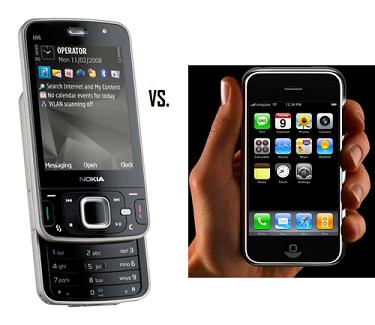Vice-versa, when a die-hard Windows Mobile user picks up an iPhone, he or she might think, "This is a locked-up, inflexible platform designed mainly to get you to buy more stuff from Apple , like movies, music and apps."

While Microsoft's Windows Mobile division may have seemed a bit stagnant for the last couple of years, the software giant is reinvigorating its mobile phone operating system. In February, the company announced that the next generation of Windows phones will be based on Windows Mobile 6.5, and we can expect to see Microsoft focus less on the old "Windows Mobile" moniker with a version number. Rather, it will tend to refer to the devices the platform powers simply as "Windows phones."
Consumers vs. Enterprise Users
The iPhone's intuitive touch interface, media-friendly integration with iTunes and a simple email setup and integration combine to make a big difference between it and Windows Mobile phones in the eyes of many consumers.
Some of the other big differences, however, result from Microsoft's go-to-market strategy and the history of Windows Mobile. For instance, Microsoft doesn't build its own hardware like Apple does with its iPhone.
"Windows Mobile is licensed to other manufacturers, and it has deep back-end development options," Ken Dulaney, an analyst and vice president of mobile and wireless research for Gartner , told MacNewsWorld. Plus, while Apple has made great strides in attracting developers to the iPhone OS platform, there are far more developers for the Windows Mobile/Windows Phone operating system.
Does that make the Windows Mobile operating systems and the actual devices more flexible than iPhone OS and the iPhone?
"That depends on how you define flexibility," Dulaney said. "Windows Mobile has many more options for just about everything, [but] from a user standpoint, Apple has many more app options."
This, of course, brings up the idea that there are certain types of users who are best suited to an iPhone, and others who are better matched with a Windows phone.
Last but Not Least: Accessories
There is one last key angle of consideration, and that's accessories. In this space, Apple wins hands-down, largely thanks to the company's successful iPod line. The popularity of the MP3 player attracted a great deal of attention from accessory makers, many of which have expanded their lines to include iPhone accessories over the past two years.
"The iPhone taps into a huge -- and growing -- market of third-party accessories and [even] docks in cars and airplanes," Greengart said. "With iPhone 3.0 software, these accessories can directly interact with iPhone apps." Accessories for Windows Mobile phones, he said, are largely limited to cases.
All in all, the differences between iPhone and Windows Mobile are huge. However, they will clearly become smaller as Microsoft becomes more consumer-friendly and Apple becomes more willing to play with businesses -- assuming, of course, that Apple doesn't blow everyone away with something that turns everything upside-down this summer.














